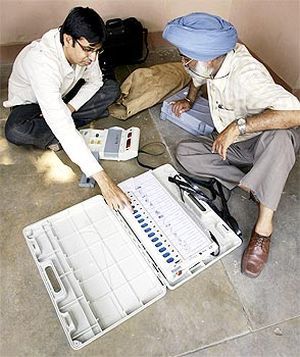 'India's election process is smoother, more efficient, more credible, cheaper to conduct and quicker to deliver than any other large democracy, including the United States.'
'India's election process is smoother, more efficient, more credible, cheaper to conduct and quicker to deliver than any other large democracy, including the United States.'
'It seems to me that the election process is getting better with each passing year and it is something all Indians can be very proud of,' says Aakar Patel.
The finest achievement of Indian democracy is the functioning of the Election Commission of India.
In that sense, it is the bureaucracy and the state machinery's contribution and not that of the people.
India's election process is smoother, more efficient, more credible, cheaper to conduct and quicker to deliver than any other large democracy, including the United States.
The elections in Bihar, which just ended, demonstrate this fact. Many of us who are no longer young will remember that Bihar and Haryana were states where elections were not easy to conduct. I am not just referring to the electoral violence, which seems to have ended almost entirely in India, but also the lack of fuss with which the government does its job.
Two election commissioners changed the way elections were conducted in India.
The first was T N Seshan (who was Chief Election Commissioner from 1990 to 1996). He was important because before him the CEC was more or less a puppet of the government.
Seshan made his office powerful, using the laws already available to him. Under him the Commission began to firmly implement the codes of conduct. If I remember it right, it was during his time that the election commission began to send videographers to record campaign speeches.
He also ensured that no sops were promised by the government during the period of campaigning.
The first real smooth election in Bihar was the 1995 one under Seshan, in which Lalu Yadav won. That was 20 years ago. Seshan had deployed 650 companies of paramilitary units (meaning about 65,000 people) to guard the polling stations and keep the peace.
His success in that election more or less ended the period of anarchy that many of us were used to seeing during elections and since then it has been taken for granted by us that elections in India will be free and fair.
Seshan's successor as CEC was M S Gill (1996 to 2001). Like Seshan, Gill was a former bureaucrat and therefore totally familiar with how and where the Election Commission should intervene to neutralise the political parties in office.
If Seshan made elections credible, Gill's contribution was on the side of the voter. He introduced the Electronic Voting Machines that have reduced the time taken for people to vote to such an extent that most of us have to wait for no longer than a couple of minutes before casting our vote.
The EVM, as most Indians call it, is a machine of pure genius. It is simple of design and each time I vote I marvel at how easy it is to do so these days. It costs Rs 5,500 per unit to make originally and runs on a battery, and so not being affected by our power cuts.
India's parties are represented by symbols because of large levels of illiteracy and it is the easiest thing for anyone to do to go to the symbol of their choice and press the button next to it. A loud beep assures them that their vote has been included.
Gill said in an interview once that the machines had been around before his time but they had not been tested. He conducted a mock test in a market with people including those who could not read and he was convinced that they would work.
They were first deployed in 1996 in 1998 in a few assembly constituencies and soon the paper ballot was eliminated. I had met him in Hyderabad just after he had deployed the EVMs and I remember how excited he was. He spoke continuously for 40 minutes before asking me why I had come to see him.
In the current Bihar elections, Rs 300 crore (Rs 3 billion) was spent by the Election Commission on conducting elections and securing the polling booths. To put that in perspective, Australia's election commission has an annual budget of Rs 1,700 crore (Rs 1.7 billion) and Bihar has a population four times that of Australia.
The other thing that this election in Bihar brought was innovations in how the Commission interacted with candidates. Reports say that approvals, which usually were difficult to get, now took less than 24 hours because of this. These approvals relate to setting up loudspeakers and holding rallies, all of which are monitored.
The second thing is a software to track complaints by voters and in Bihar 7,452 complaints were received of which 7,316 were disposed of, which is to me remarkable.
The last thing is a software to track private vehicles which are commandeered by the Election Commission for its use, through GPS, and quick payment for their use.
Live Web casting from polling booths is now also being used to make the process more secure. It seems to me that the election process is getting better with each passing year and it is something all Indians can be very proud of.
Aakar Patel is Executive Director, Amnesty International India. The views expressed here are his own.
You can read more of his columns here.










